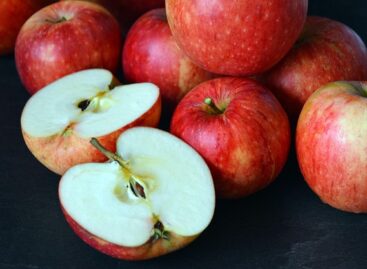István Nagy: regular consumption of honey is a step towards a more livable future
Regular consumption of honey is an important step for a more livable future – the Minister of Agriculture stated at the central event of the European Honey Breakfast – Let every day be a honey day program in Szihalmon on Friday.
 István Nagy highlighted: more than two-thirds of food depends on bee pollination. About 20,000 beekeepers in Hungary assume the greatest responsibility for this, taking care of 1.2 million bee colonies. That is why the density of bees in Hungary is among the highest in the world: 12 families per square kilometer, which ensures pollination – he underlined.
István Nagy highlighted: more than two-thirds of food depends on bee pollination. About 20,000 beekeepers in Hungary assume the greatest responsibility for this, taking care of 1.2 million bee colonies. That is why the density of bees in Hungary is among the highest in the world: 12 families per square kilometer, which ensures pollination – he underlined.
He pointed out: of the 25,000 to 35,000 tons of honey produced annually in the country, which is of outstanding quality even in the world, the population of the country consumes only one kilogram per person. The goal is to double this by 2030.
According to István Nagy, it is important that this message reaches more than 208,000 students in more than 1,000 institutions. At the same time, he drew attention to the fact that bees are true examples of cooperation, since their effectiveness lies in the strength of their community.
Marjan Cencen, Ambassador of the Republic of Slovenia, recalled at the event: the announcement of World Bee Day in 2014 was initiated by the Slovenian beekeeping association at the UN.
The purpose of the mission is to draw attention to the fact that bees are one of the most important elements of food security, sustainable development, biological diversity, adaptation to climate change, and the resilience of communities and peaceful coexistence, he said.
He underlined: pollinators are the keys to the health of the global ecosystem, as nearly 90 percent of plants growing in the wild, three quarters of food plants, and 35 percent of agricultural land depend on them. Since bees are threatened by human influences, recognition of their importance contributes to the success of conservation measures, and they contribute to the solution of humanity’s food supply problems.
Related news
The government is providing significant resources to support the development of crop dryers.
🎧 Hallgasd a cikket: Lejátszás Szünet Folytatás Leállítás Nyelv: Auto…
Read more >A change of era in the glass
🎧 Hallgasd a cikket: Lejátszás Szünet Folytatás Leállítás Nyelv: Auto…
Read more >Hungarian apples are safe and of high quality
🎧 Hallgasd a cikket: Lejátszás Szünet Folytatás Leállítás Nyelv: Auto…
Read more >Related news
GDP growth in OECD member countries slowed to 0.3 percent in the last quarter of last year
🎧 Hallgasd a cikket: Lejátszás Szünet Folytatás Leállítás Nyelv: Auto…
Read more >








